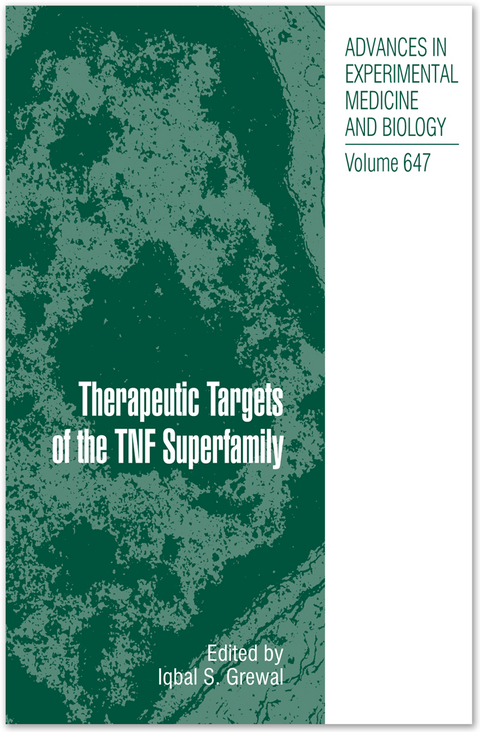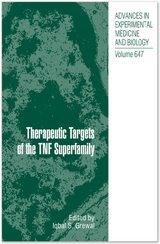Therapeutic Targets of the TNF Superfamily
Springer-Verlag New York Inc.
978-0-387-89519-2 (ISBN)
Iqbal S. Grewal, PhD is well-known in the field of T cell co-stimulation and autoimmunity and has extensively investigated several members of the TNF superfamily and molecules important for lymphocyte co-stimulation. His research has focused on the basic molecular and cellular processes to determine the biological roles of these molecules in normal physiology and immunity and their potential utility as agents or targets for the treatment of autoimmune diseases and cancers. His experience in discovering and developing innovative protein-based biotherapeutics in many disease areas has translated some of his findings into key drug candidates for the treatment of autoimmune disease and cancers. Dr Grewal currently holds the position of Vice President of Preclinical Therapeutics at Seattle Genetics in Bothell, Washington. He is responsible for preclinical translational research functions in support of the development of monoclonal antibodies and antibody-drug conjugates as therapeutics in the areas of autoimmunity and oncology. Before joining Seattle Genetics, Dr Grewal performed drug discovery research and preclinical development at Genentech in South San Francisco, California where he identified and validated several novel molecules as therapeutic candidates in oncology and autoimmune disease. Prior to Genentech, Dr Grewal worked at Yale University School of Medicine. Before that, he held various research positions at the University of California, Los Angeles (UCLA). Dr Grewal has presented his work at both national and international meetings, as well as published over 100 scientific publications, 75 abstracts, 60 patent applications. He is a fellow of the Royal College of Pathologists, London and member of several distinguished societies. Dr Grewal holds a PhD in Immunology from UCLA and completed his post-doctoral fellowship at Howard Hughes Medical Institute at Yale University School of Medicine.
Overview of TNF Superfamily: A Chest Full of Potential Therapeutic Targets.- Therapeutic Interventions Targeting CD40L (CD154) and CD40: The Opportunities and Challenges.- Targeting TNF for Treatment of Cancer and Autoimmunity.- Targeting of BAFF and APRIL for Autoimmunity and Oncology.- The Role of FasL and Fas in Health and Disease.- OX40 (CD134) and OX40L.- Targeting CD70 for Human Therapeutic Use.- 4-1BB as a Therapeutic Target for Human Disease.- RANK(L) as a Key Target for Controlling Bone Loss.- Targeting the LIGHT-HVEM Pathway.- GITR: A Modulator of Immune Response and Inflammation.- Targeting CD30/CD30L in Oncology and Autoimmune and Inflammatory Diseases.- Tumor Necrosis Factor Receptor Superfamily Member 21: TNFR-Related Death Receptor-6, DR6.- TRAIL and Other TRAIL Receptor Agonists as Novel Cancer Therapeutics.- Therapeutic Potential of VEGI/TL1A in Autoimmunity and Cancer.
| Reihe/Serie | Advances in Experimental Medicine and Biology ; 647 |
|---|---|
| Zusatzinfo | XVII, 220 p. |
| Verlagsort | New York, NY |
| Sprache | englisch |
| Maße | 178 x 254 mm |
| Themenwelt | Studium ► Querschnittsbereiche ► Infektiologie / Immunologie |
| ISBN-10 | 0-387-89519-1 / 0387895191 |
| ISBN-13 | 978-0-387-89519-2 / 9780387895192 |
| Zustand | Neuware |
| Haben Sie eine Frage zum Produkt? |
aus dem Bereich




